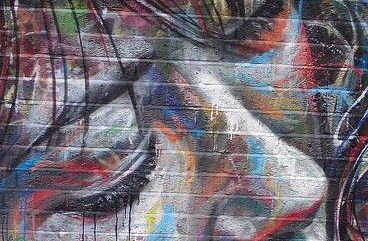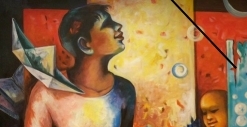In Woody Allen’s “Midnight in Paris”, the protagonist complaints that he doesn’t know whether he should marry his fiancee, and whether he loves her at all. The reply he gets from a fictional Ernest Hemingway contains the most brilliant lines in the movie (quoting from memory):
When you make love to her, do you feel immortal? Because if you don’t, you don’t really love her. When a man makes love to a woman he loves, he isn’t afraid of death anymore – in that moment he is immortal.
The Fear
We all destined to die, and there isn’t anything we can do about it. We are born with our own destruction built into us. What makes this universal condition of any living organism truly tragic for us, is the fact that we are aware of it. But the more we avoid thinking about it, the more we try to cover up our anxiety with distractions the more likely are they to resurface later as a neurosis.
Somewhat paradoxically, our fear of dying becomes especially unbearable when we aren’t living. When we feel that our life passes us by, and we are just lifeless robots in it, executing scripts, going through the motions, without passion, excitement or curiosity – it’s then that our fear of death becomes intolerable.
On the other hand, have you ever met a happy person who is preoccupied with thoughts about death? Isn’t that curious that someone who has seemingly “more to lose” is less anxious about the whole thing?
The Cure
Woody Allen hints to the answer. There is a cure to the fear of death, and it’s love. Love creates a bond between us and an object outside ourselves, and transforms us. We are no longer the lonely, isolated, wretched creatures, terrified of our final little tragedy. Instead, we become part of something larger then us, that which will survive our death – in our children, in our deeds, in our causes, in the days we made our lovers happy.
When we love, we live. And when we live, truly live our lives – death loses its terrifying power over us.
Today, however, we are having a hard time living because we are so bent on outwitting death – Simone de Beauvoir



over-simplify, infantile…but I LOVE IT!
Hi Galya,
Thanx for the love 🙂
Over-simplified – for sure, but I wonder why do you think it’s infantile?
Irwin Yalom has written a great book about our fear of death, and how we can overcome it, called “Staring at the Sun”. If you are ready for something more substantial than a quick blog post, I suggest you check it out (http://www.amazon.com/Staring-Sun-Overcoming-Terror-Death/dp/0787996688)
p.s.
Congrats on your first comment here 🙂
A major difference between an atheist and a believer (religious or spiritual/conscious person) is their attitude towards death. I can’t judge about feelings of a materialist because I think that I am far too weak to be one. It is unbearably horrifying, in my opinion, not to believe in life after death (doesn’t matter in which form). That is why I was so much relieved as a normal Soviet child brought up in atheism, when I was told stories about shamans and ghosts, because my childhood was darkened by that paralyzing fear of death. The moment I heard these stories told by my Mom about her childhood experiences I believed that the world was not just plain matter. There is something else, beyond that fringe! Then I read about “Life after life” by Moody and my belief had fortified even more.
I would say that I am not afraid of death as it is. There can be different kinds and forms of death, some of them of course one would not choose for herself, but in general there’s no death. At least I believe in it. When I was in love and there were Apocalyptic talks around about 2012 and stuff, I would feel calm, it was comforting to think that we can die together with my loved one at the end of the world. Depression makes it even easier to think about death because nothing is keeping you here. So, I guess this existential problem is just a problem for an atheist.
Radjana,
thank you for your thoughtful comment 🙂
Death anxiety is definitely much more acute in the west, where religion and spirituality have been
superseded by science, atheism and critical thinking. And while thanks to it we gained prosperity, we lost instrumental tools for coping with fear of death, without developing new ones.
it’s easier to cope with the idea of death for people in traditional societies, since they
have working concepts of the next world / natural cycle of
things, etc.
Your experience shows that even though the Soviet atheism was prevalent in the school and on the
TV, it hasn’t fully penetrated the common beleives and traditions of the Buryat people. Storied your mother told you made sense to you as a child, and gave you a stable ground as an adult to explore the belief in life after death.
But for many of us, the option of adopting a traditional belief isn’t easily accessible – it’s just not part of our societal DNA. And so we are left naked before the paralyzing fear of death. Too horrible to deal with, we suppress these thoughts. But as any epression, it never really leaves us, emerging as in neurosis, or as a deep dissatisfaction with our life.
So if traditional beliefs and repression don’t work, what are we left with? Is there a way to authentically cope with the fear, without resorting to escapism (fantasies/distractions are a sort of repression) and unauthentic beliefs (things we want to believe in, but can’t really)?
There is.
Befriend death. Make it a part of our life. Throw away the vague concept of a catastrophe, waiting to happen, and realize the concrete, inevitable but natural character of our own end. And with that in mind – START LIVING. Examine our life, find our mission, love generously, be courageous.
Ultimately, a life lived fully is easier to leave behind.
Plato (through Socrates, through Diotima) defined love as the quest for immortality (Platonic love is a much later interpretation). I think that’s still relevant today after 2 thousand years.
While many things changed, the basic human condition hasn’t changed over the last 3000 years. It’s always fascinating to find a wisdom we can truly relate to in the words of people who lived millenniums ago.
Все смертны – и это нужно понимать отчетливо каждому человеку. Конечно же, это не должно превратиться в фобию, мешающую жить “полной грудью”. Но без осознания этого факта человек может долго и упорно испытывать судьбу, часто рискуя собой по пустякам без надобности (к примеру экстремалы, но для них есть отдельный диагноз в психологии, имеющий корни в их далеком детстве). Любовь делает нас чище, выше, но в то же время она является великим недостатком, ибо ты теперь не один в этом мире, у тебя есть вторая половинка, которую ты порой любишь больше,чем себя, а также очень боишься потерять. В том числе и боязнь кончины партнера тоже может перерасти в фобию, если сосредоточиться исключительно только на мысли “а как бы с моим любимым чего бы не случилось”. Нужно просто относится к смерти философски и как к неизбежному, без паранои, но тем временем не забывать жить в полной мере и оставлять свои “следы” на жизненном пути, чтобы на смертном одре сказать себе: “Да, я прожил жизнь не зря!”
Hi Naoko, thank you for this comment.
You mention a very important point. While love, as I write in the post, frees you, to a certain point, from your existential fears, it also creates a strong attachment. So now you have less fears of your own death, but you are afraid of losing your love.
How to love without getting anxious – this is a great question. Buddhists talk a lot about the problem of excessive attachment, so I guess we can learn from them a thing or two.